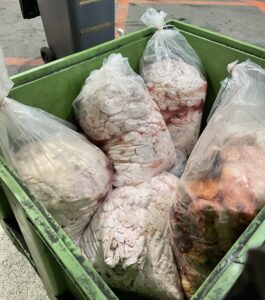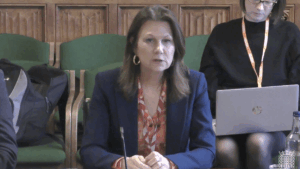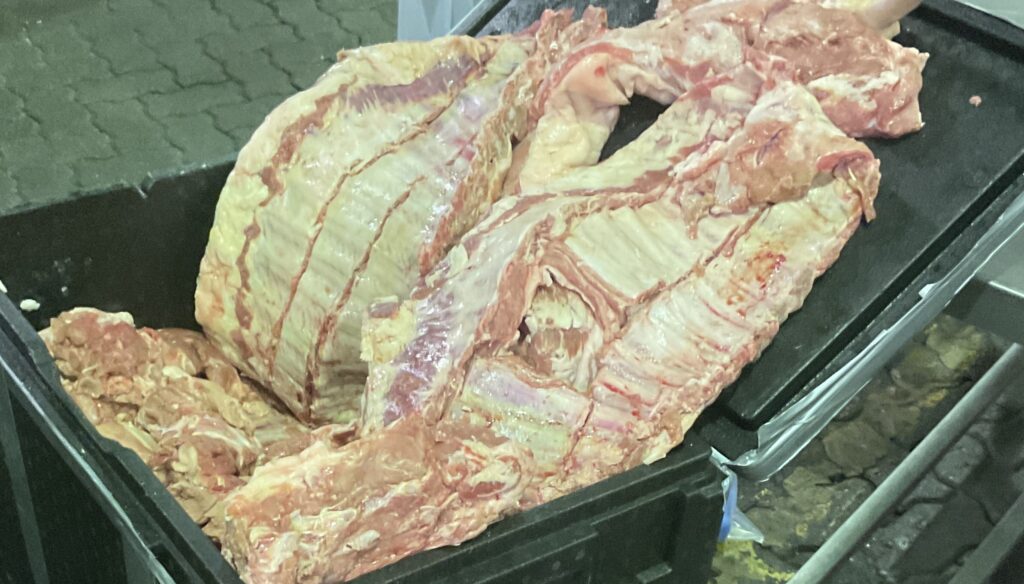The Dover Port Health Authority (DPHA) has told MPs the £3.1 million offered by Defra for illegal meat controls is not sufficient to protect UK livestock from potentially devastating diseases circulating in Europe, as the row over funding at Dover escalates.
Lucy Manzano, DPHA’s head of port health & public protection, was heavily critical of the department’s approach to national biosecurity in a submission to the Environment, Food and Rural Affairs Committee inquiry into the subject.
Her submission was published on the day that Baroness Sue Hayman, Defra’s minister with responsibility for biosecurity, appeared in front of the committee. In turn, the minister suggested DPHA could be more effective in seizing illegal meat imports if it spent the money allocated more effectively.
DPHA submission
In her submission, Ms Manzano revealed that DPHA has now removed 230 tonnes of illegal product of animal origin (POAO) since September 2022 and that the volumes are rising. A total of 70 tonnes was seized between January 1 and April 28 this year, compared with 24t during the same period in 2024 and just 13t in 2023.
She confirmed that, for 2025/26, Defra offered DPHA £3.1m to deliver ‘pro-active illegal meat controls’ at Dover and Coquelles, the Channel Tunnel entry point, in France.
“This figure is not sufficient, nor are the stipulations made by Defra, that vets and the system used to record our seizures will no longer be paid for,” Ms Manzano wrote.

She said the funding enables less than 0.2% of vehicles arriving via Dover to be checked, with checks to take place during a 20% operational window, meaning that 80% of the time there will be no pro-active checks. It also provides no provision for checks at Coquelles, while no funding commitment has been indicated for post March 2026.
In a letter to Baroness Hayman, she said: “We continue to see escalating numbers of large loads containing illegal products of animal origin (POAO) clearly not for personal consumption and destined for commercial markets, simply driving through.
“In addition, we have provided you with examples of illegal and banned meats arriving via the BTOM (commercial) route that end up on our high streets for sale, having evaded check, control or interception by Sevington (via the very route Defra designed and implemented to prohibit such imports).
“And of course, Foot and Mouth Disease (FMD) products requiring prohibition, being auto-cleared by Defra’s own system (TODCOF) to travel into and across GB.
“As such, it is for these facts, that I cannot (at the Short Straits) support your assertion that the ‘Border Target Operating Model (BTOM) continues to provide a robust Sanitary and Phytosanitary (SPS) system of commercial import controls to protect UK biosecurity’.
“Or when referring to the suitability of £3.1m, that ‘the offer is reviewed against the Government’s priority to protect UK biosecurity, and I am (Baroness Hayman) confident that it strikes the right balance’.
“The Defra team advising you, have neither visited our operations, nor discussed them with us in any substantive terms, and the letter (detailing the funding offer) provides no narrative to explain what evaluation, plan, or strategy has been considered or conducted to conclude that a figure of £3.1m was required.”
Baroness Hayman’s respone

Asked about the funding offer while giving evidence to EFRA on Tuesday, Baroness Hayman said Defra had been trying to reach a funding settlement as ‘the work Dover does in tackling illegal meat entering the country is very important’. “We then signed off the payment that they had been waiting for, and we offered them £3.1m going forward,” she said.
She said Dover officials have discussed their concerns with Defra, including around funding, and she acknowledged that there was a need for ‘better communications between us’.
She said Defra had tried to do ‘pin DPHA down on what we actually need to be resourcing. “We need to focus on picking up the illegal meat, for example. A couple of times, we have asked them to re-focus the budget.”
Asked if 20% coverage at Dover was sufficient, she replied: “We would suggest that if the budget was purposed in the way we are proposing, it would be more than 20%.”
EFRA committee Charlie Dewhirst, the former NPA senior policy adviser, suggested that if there was an incursion of a major notifiable disease, offering Dover only 20% operational coverage would ‘look poorly on the authorities in any future public inquiry, particularly if it came via Dover.
Responding, Baroness Hayman said: “We are working with DPHA on how to move forward on funding and we are currently looking at what the focus of that funding should be because we believe that some of the areas that Dover has proposed comes out of that money are not necessary, for example, veterinary fees.”
Asked by EFRA chair Alistair Carmichael to clarify the comment, she added: “What we are trying to do is tackle the import of illegal meat and Dover is working with Border Force to pick that illegal meat up – and our thought is that you don’t need a vet to check a piece of meat. If it’s illegal, it’s illegal.”
Critical role of vets
However, in her submission to the EFRA Committee, Ms Manzano said DPHA cannot accept Defra’s position on official veterinarians (OVs).
“The OV skill set is unreplicated within the team, and they are critical to the successful delivery of this highly
challenging and unique area of work, which includes complex identification processes of POAO and animal by-products etc.
“This is not, as has been implied previously, simply a case of identifying a salami or some sausages. Indeed, the presentations seen are often more complex than would be found within a BCP itself. As the statutory authority responsible for safeguarding Port Health matters at this border, and for the reasons previously outlined, DPHA would be unable to deliver this function without the minimal OV provision currently used.”
Ms Manzano was also heavily critical of how the BTOM system for commercial imports was operating and Defra’s response to the Germany foot-and-mouth outbreak in January.
“Our experience and the impact of working with Defra to date, is that they appear ‘locked-in, and inflexible in their thinking and mindset towards this border, and concerningly without obvious appetite for inquiry or change,” she wrote.
“Even with the threat of FMD and ASF in Europe looming, and clear and repeated evidence of border failures allowing significant volumes of prohibited products into the UK, our requests for urgent action and additional funding, remain unanswered.”
Baroness Hayman was question on various aspects of Defra’s approach to border controls during the hearing on Tuesday.




